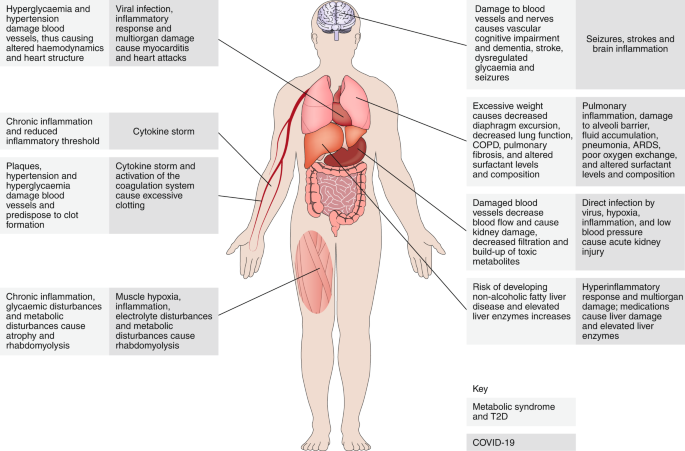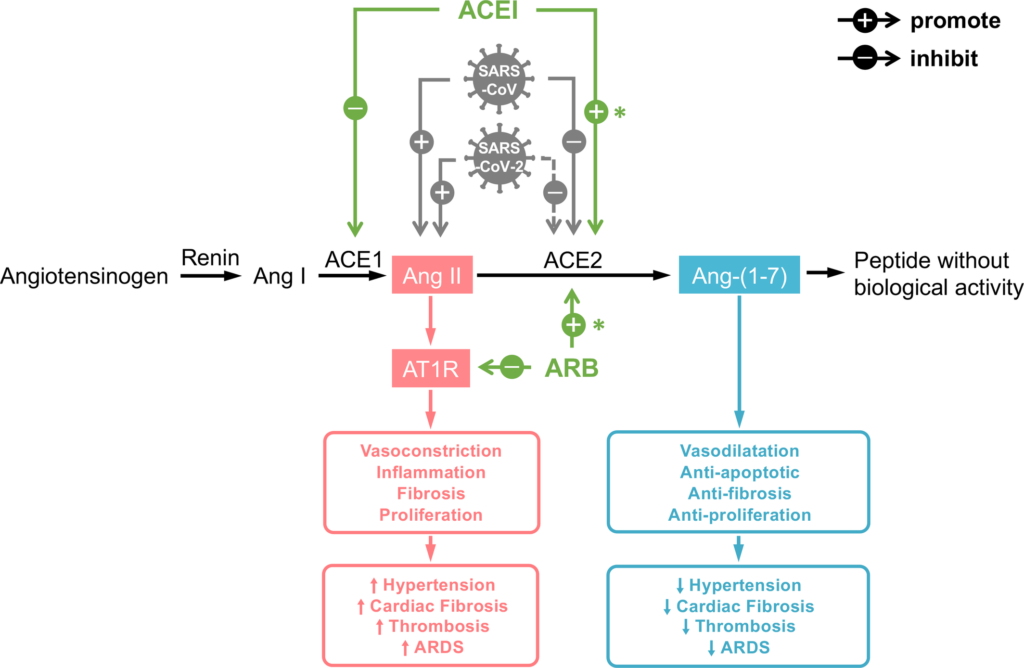Several studies have shown that COVID 19 has a mutually aggravating relationship with metabolic syndrome: COVID19 clearly aggravates and also gets aggravated by pre-existing metabolic syndrome. Data from all over the world have shown that the mortality due to COVID19 is higher in the elderly above 60 years and in patients with metabolic syndrome related problems such as type 2 diabetes, hypertension, severe obesity etc.

SARS CoV2 virus, the causative agent of COVID19, enters the human cells by tagging to Angiotensin Coverting Enzyme 2 (ACE) receptors on the cells. Higher expression of ACE2 allows more viral particles to enter, and the virus itself increases the expression of ACE2, helping more viral particles to enter.
It has been shown that sucrose, table sugar, increases the expression of ACE2. Type 2 diabetes, hypertension, cardiovascular disease, obesity, fatty liver, chronic kidney disease have all been linked to metabolic syndrome, and insulin resistance, that in turn are linked to consumption of sucrose and fructose. All these conditions are associated with higher ACE2 expression in the lungs, increasing the risk of infection with SARS CoV2 and more severe outcomes of COVID19. Increased prevalence of metabolic syndrome, smoking and alcoholism among men is blamed for higher incidence of severe COVID19 and related mortality among men.

ACE2 converts angiotensin 2 into angiotensin 1-7, and these in turn are involved in the complex regulation of blood glucose, blood pressure, inflammatory pathways etc. As COVID19 affects ACE2, glucose and insulin metabolism get affected, and this can worsen regulation of blood glucose, blood pressure, and cardiovascular health, which in turn can worsen COVID19, developing into a vicious circle. Angiotensin 1-7 also play a role in lung protection, and infection of ACE2 therefore contributes to lung injury.

It has been reported that external manifestations of insulin resistance may indicate higher risk for severe COVID19. Baldness in men, acanthosis nigricans (dark colouration of arm pits and neck), severe acne, hirsutism, psoriasis, chronic Candidiasis over skin folds and genitals are such manifestations, and anyone having them needs to get evaluated and take necessary precautions.
Whereas COVID19 tends to be more severe in persons known to be having disorders of metabolic syndrome, many of those apparently healthy persons who developed severe COVID19 probably had hidden or undiagnosed disorders of metabolic syndrome. In either situations, COVID19 exacerbates the metabolic syndrome and vice versa. It is now well established that post COVID19, some patients develop type 2 diabetes, hypertension, cardiovascular events etc., and these are most likely the due to exacerbation and unmasking of the underlying metabolic syndrome that had remained undetected until then. Therefore, anyone who had more than a mild COVID19 must consider it as an indicator of underlying metabolic syndrome related problems and must take necessary measures for evaluation and management.
Sucrose increases ACE2 expression and risk of severe COVID19, patients with symptoms of COVID19 (and others too) can avoid the consumption of sugar, sweets, fruits and fruit juices, refined grains and processed foods, refined oils and fried foods, and also alcohol and smoking. Vegetables, nuts, fish, eggs and meat help to strengthen our immune system and must be encouraged.
Remember: Those who have disorders of metabolic syndrome tend to have severe COVID19 and those who have had severe COVID19, are very likely to have had hidden problems of metabolic syndrome and therefore, they need to get evaluated for the same.
By: Dr. Srinivas Kakkilaya, MD (Internal Medicine) | Dr. Balasaraswathy, DNB (Dermatology)
ಕೊರೋನ ರೋಗ ಮತ್ತು ಉಪಾಪಚಯದ ಸಮಸ್ಯೆಗಳು
ಕೊರೋನ ಸೋಂಕು ಮತ್ತು ನಮ್ಮ ದೇಹದೊಳಗಿನ ಉಪಾಪಚಯ ಸಂಬಂಧಿ ಕಾಯಿಲೆಗಳು ಪರಸ್ಪರ ಉತ್ತೇಜಿಸಿಕೊಂಡು ಸಮಸ್ಯೆಗಳಿಗೆ ಕಾರಣವಾಗುತ್ತವೆ ಎನ್ನುವುದನ್ನು ಹಲವು ಅಧ್ಯಯನಗಳು ತೋರಿಸಿವೆ. ಕೊರೋನ ಸೋಂಕು ಉಪಾಪಚಯ ಸಂಬಂಧಿತ ಸಮಸ್ಯೆಗಳನ್ನು ತೀವ್ರಗೊಳಿಸಿದರೆ, ಉಪಾಪಚಯ ಸಂಬಂಧಿತ ಸಮಸ್ಯೆಗಳು ಕೊರೋನ ಸೋಂಕನ್ನು ಉಲ್ಬಣಿಸುತ್ತವೆ. ಕೊರೋನ ಸೋಂಕಿನಿಂದ ಮಾರಣಾಂತಿಕವಾದ ಸಮಸ್ಯೆಗಳಾಗುವುದು 60 ವರ್ಷಗಳಿಗೆ ಮೇಲ್ಪಟ್ಟ ಹಿರಿಯ ವಯಸ್ಕರಲ್ಲಿ , ಉಪಾಪಚಯ ಸಂಬಂಧಿ ರೋಗಗಳಾದ ಸಕ್ಕರೆ ಕಾಯಿಲೆ, ರಕ್ತದ ಏರೊತ್ತಡ, ವಿಪರೀತ ಬೊಜ್ಜು ಇತ್ಯಾದಿಗಳಿರುವವರಲ್ಲಿ ಎನ್ನುವುದು ವಿಶ್ವದಾದ್ಯಂತ ಸೋಂಕಿನ ಆರಂಭದಿಂದಲೂ ಕಂಡುಬಂದಿದೆ.
ಕೊರೋನ ಸೋಂಕನ್ನುಂಟು ಮಾಡುವ ಎಸ್ಎಆರ್ಎಸ್ ಕೊವಿ2 ವೈರಸ್ ಮನುಷ್ಯರ ಜೀವಕಣಗಳಲ್ಲಿರುವ ACE2 ಎಂಬ ಕಿಣ್ವಕ್ಕೆ ತಗಲಿಕೊಂಡು, ಅವುಗಳ ಮೂಲಕ ಜೀವಕೋಶಗಳನ್ನು ಪ್ರವೇಶಿಸುತ್ತವೆ. ACE2 ಪ್ರಮಾಣವು ಹೆಚ್ಚಿರುವವರಲ್ಲಿ ಹೆಚ್ಚು ವೈರಸ್ಗಳು ಪ್ರವೇಶಿಸಲು ಅವಕಾಶವಾಗುತ್ತದೆ; ಹಾಗೆ ಒಳಹೊಕ್ಕ ವೈರಸ್ ಇನ್ನಷ್ಟು ACE2 ಕಿಣ್ವಗಳನ್ನು ಪ್ರಚೋದಿಸಿ ಮತ್ತಷ್ಟು ವೈರಾಣುಗಳ ಪ್ರವೇಶಕ್ಕೆ ಅವಕಾಶವಾಗುತ್ತದೆ.
ಸುಕ್ರೋಸ್, ಅಂದರೆ ಚಮಚದ ಸಕ್ಕರೆ, ಸೇವನೆಯು ACE2 ಮಟ್ಟವನ್ನು ಹೆಚ್ಚಿಸುತ್ತದೆ ಎಂದು ಅಧ್ಯಯನಗಳು ತೋರಿಸಿವೆ. ರಕ್ತನಾಳಗಳ ಕಾಯಿಲೆ, ಹೃದಯಾಘಾತ, ರಕ್ತದ ಏರೊತ್ತಡ, ಎರಡನೇ ವಿಧದ ಸಕ್ಕರೆ ಕಾಯಿಲೆ, ಬೊಜ್ಜು, ಯಕೃತ್ತಿನ ಕಾಯಿಲೆ, ಕೆಲ ವಿಧಗಳ ಮೂತ್ರಪಿಂಡಗಳ ವೈಫಲ್ಯ ಇತ್ಯಾದಿಗಳು ಸಕ್ಕರೆ ಭರಿತವಾದ ಆಧುನಿಕ ಆಹಾರದ ಸೇವನೆಯಿಂದ ದೇಹದ ಉಪಾಪಚಯದಲ್ಲಾಗುವ ಸಮಸ್ಯೆಗಳಿಂದ ಮತ್ತು ಇನ್ಸುಲಿನ್ ಹಾರ್ಮೋನಿನ ಕಾರ್ಯಚ್ಯುತಿಯಿಂದ ಉಂಟಾಗುತ್ತವೆ, ಇವಕ್ಕೆ ಸುಕ್ರೋಸ್ ಮತ್ತು ಫ್ರಕ್ಟೋಸ್ ಸಕ್ಕರೆಗಳ ಅತಿ ಸೇವನೆಯೇ ಕಾರಣವೆನ್ನಲಾಗಿದೆ. ಈ ಸಮಸ್ಯೆಗಳಿದ್ದವರ ಶ್ವಾಸಕೋಶಗಳಲ್ಲಿ ACE2 ಕಿಣ್ವದ ಮಟ್ಟವು ಹೆಚ್ಚಿನ ಮಟ್ಟದಲ್ಲಿರುವುದರಿಂದ ಎಸ್ಎಆರ್ಎಸ್ ಕೊವಿ2 ಸೋಂಕುಂಟಾಗುವ ಸಾಧ್ಯತೆಗಳು ಮತ್ತು ರೋಗವು ಉಲ್ಬಣಿಸಬಹುದಾದ ಸಾಧ್ಯತೆಗಳು ಹೆಚ್ಚಬಹುದು. ಕೊರೋನ ಸೋಂಕು ಉಲ್ಬಣಿಸುವ ಸಾಧ್ಯತೆಗಳು ಗಂಡಸರಲ್ಲೇ ಹೆಚ್ಚೆಂದು ಕಂಡುಬರುತ್ತಿರುವುದಕ್ಕೆ ಉಪಾಪಚಯದ ಸಮಸ್ಯೆಗಳು, ಮದ್ಯಪಾನ ಮತ್ತು ಧೂಮಪಾನಗಳು ಗಂಡಸರಲ್ಲಿ ಹೆಚ್ಚಿರುವುದೇ ಕಾರಣವೆನ್ನಲಾಗಿದೆ.
ಮನುಷ್ಯರಲ್ಲಿ ACE2 ಕಿಣ್ವವು ಆಂಜಿಯೋಟೆನ್ಸಿನ್ 2 ಎಂಬ ಸಂಯುಕ್ತವನ್ನು ಒಡೆದು ಆಂಜಿಯೋಟೆನ್ಸಿನ್ 1-7 ಆಗಿ ಪರಿವರ್ತಿಸುತ್ತದೆ. ಈ ಸಂಯುಕ್ತಗಳು ಮನುಷ್ಯರಲ್ಲಿ ರಕ್ತದಲ್ಲಿ ಸಕ್ಕರೆಯ ನಿಯಂತ್ರಣ, ರಕ್ತದೊತ್ತಡದ ನಿಯಂತ್ರಣ, ಉರಿಯೂತದ ನಿಯಂತ್ರಣ ಎಲ್ಲದರ ಅತಿ ಸಂಕೀರ್ಣವಾದ ವ್ಯವಸ್ಥೆಯಲ್ಲಿ ಪಾತ್ರಗಳನ್ನು ಹೊಂದಿವೆ; ಹೊಸ ಕೊರೋನ ಸೋಂಕು ACE2 ಅನ್ನು ಬಾಧಿಸುವುದರಿಂದ, ಗ್ಲೂಕೋಸ್ ಮತ್ತು ಇನ್ಸುಲಿನ್ ಉಪಾಪಚಯದಲ್ಲಿ ಸಮಸ್ಯೆಗಳಾಗಿ, ಸಕ್ಕರೆ ಕಾಯಿಲೆ, ರಕ್ತದ ಏರೊತ್ತಡ, ಹೃದ್ರೋಗ ಇತ್ಯಾದಿ ಉಪಾಪಚಯದ ಸಮಸ್ಯೆಗಳು ಇನ್ನಷ್ಟು ಉಲ್ಬಣಗೊಳ್ಳಬಹುದು, ಜೊತೆಗೆ, ಕೊರೋನ ಸೋಂಕನ್ನೂ ಬಿಗಡಾಯಿಸಿ, ಎಲ್ಲವೂ ಜೊತೆಗೆ ವಿಷವರ್ತುಲವಾಗಿ ಬೆಳೆಯಬಹುದು. ACE2ನಿಂದ ಹುಟ್ಟುವ ಆಂಜಿಯೋಟೆನ್ಸಿನ್ 1-7 ಶ್ವಾಸಕೋಶಗಳ ರಕ್ಷಣೆಗೆ ಅಗತ್ಯವಾಗಿರುವುದರಿಂದ, ACE2ಗೆ ಸೋಂಕು ತಗಲಿದಾಗ ಶ್ವಾಸಕೋಶಗಳ ಹಾನಿಗೆ ದಾರಿಯಾಗುತ್ತದೆ.
ಹಲವು ಆಧುನಿಕ ಕಾಯಿಲೆಗಳಿಗೆ ಕಾರಣವಾಗಿರುವ ಇನ್ಸುಲಿನ್ ಹಾರ್ಮೋನಿನ ಕಾರ್ಯಚ್ಯುತಿಯ ಕೆಲವು ಬಾಹ್ಯ ಲಕ್ಷಣಗಳು ಕೊರೋನ ಸೋಂಕು ಉಲ್ಬಣಿಸುವ ಸಾಧ್ಯತೆಗಳನ್ನು ಸೂಚಿಸಬಹುದು ಹೇಳಲಾಗಿದೆ. ಗಂಡಸರಲ್ಲಿ ತಲೆಯ ಕೂದಲು ಕಡಿಮೆಯಾಗಿ ಬೋಳಾಗುವುದು ಇಂತಹ ಲಕ್ಷಣಗಳಲ್ಲೊಂದಾಗಿದ್ದು, ಅದು ಇದ್ದವರಲ್ಲಿ ಕೊರೋನ ಸೋಂಕು ಹೆಚ್ಚು ತೀವ್ರವಾಗಿರುತ್ತದೆ ಎಂದು ಕೆಲವು ವರದಿಗಳಾಗಿವೆ. ಕುತ್ತಿಗೆಯ ಹಿಂಭಾಗ ಮತ್ತು ಕಂಕುಳುಗಳ ಚರ್ಮವು ದಪ್ಪಗಾಗಿ, ಕಪ್ಪಾಗುವುದು, ಚರ್ಮದಲ್ಲಿ ಸಣ್ಣ ಕೆಡುಗಳಾಗುವುದು, ತೀವ್ರ ರೂಪದ ಮೊಡವೆಗಳು, ಮಹಿಳೆಯರ ಮುಖದಲ್ಲಿ ಕೂದಲಿರುವುದು, ಸೋರಿಯಾಸಿಸ್, ಚರ್ಮವು ಮಡಿಕೆಯಾಗಿರುವ ಜಾಗಗಳಲ್ಲಿ ಅಥವಾ ಜನನಾಂಗಗಳಲ್ಲಿ ದೀರ್ಘ ಕಾಲದಿಂದ ಕ್ಯಾಂಡಿಡಾ ಶಿಲೀಂಧ್ರದ ಸೋಂಕು ಇರುವುದು ಕೂಡಾ ಇನ್ಸುಲಿನ್ ಪ್ರತಿರೋಧದ ಲಕ್ಷಣಗಳಾಗಿದ್ದು, ಇವನ್ನು ಹೊಂದಿರುವವರು ತಮ್ಮ ಆರೋಗ್ಯವನ್ನು ಪರೀಕ್ಷಿಸಿಕೊಂಡು, ಸೂಕ್ತ ಎಚ್ಚರಿಕೆಗಳನ್ನು ವಹಿಸುವುದೊಳ್ಳೆಯದು.
ಮೊದಲೇ ಉಪಾಪಚಯ ಸಂಬಂಧಿತ ಸಮಸ್ಯೆಗಳುಳ್ಳವರಲ್ಲಿ ಕೊರೋನ ರೋಗವು ಉಲ್ಬಣಿಸುವುದು ತಿಳಿದಿದೆಯಾದರೂ, ಯಾವ ಸಮಸ್ಯೆಗಳೂ ಇಲ್ಲದೆ ಆರೋಗ್ಯವಂತರೆನಿಸಿಕೊಂಡವರಲ್ಲೂ ತೀವ್ರ ರೂಪದ ಕೊರೋನ ರೋಗವುಂಟಾಗಿರುವುದು ವರದಿಯಾಗಿದೆ, ಅಂಥ ಹೆಚ್ಚಿನವರಲ್ಲಿ ಉಪಾಪಚಯದ ಸಮಸ್ಯೆಗಳು ಸುಪ್ತವಾಗಿ, ಮೊದಲೇ ಗುರುತಿಸಲ್ಪಡದೇ ಇದ್ದಿರುವ ಸಾಧ್ಯತೆಗಳಿವೆ. ಈ ಎರಡೂ ಸನ್ನಿವೇಶಗಳಲ್ಲಿ ಕೊರೋನ ಸೋಂಕು ಮತ್ತು ಉಪಾಪಚಯದ ಸಮಸ್ಯೆಗಳು ಪರಸ್ಪರ ಉಲ್ಬಣಿಸುತ್ತವೆ. ಕೊರೋನ ಸೋಂಕಿನ ಬಳಿಕ ಕೆಲವರಲ್ಲಿ ಸಕ್ಕರೆ ಕಾಯಿಲೆ, ರಕ್ತದ ಏರೊತ್ತಡ, ರಕ್ತನಾಳಗಳ ಸಮಸ್ಯೆಗಳು ಉಂಟಾಗಿರುವುದಕ್ಕೆ ಮೊದಲಲ್ಲಿ ಸುಪ್ತವಾಗಿದ್ದ ಈ ಸಮಸ್ಯೆಗಳನ್ನು ಕೊರೋನ ಸೋಂಕು ಉಲ್ಬಣಿಸಿ ತೋರಿಸಿದ್ದೇ ಕಾರಣವಿರಬಹುದು. ಆದ್ದರಿಂದ, ತುಸು ತೀವ್ರ ರೂಪದ ಕೊರೋನ ರೋಗಗಳನ್ನು ಹೊಂದಿದ್ದವರೆಲ್ಲರೂ ತಮ್ಮೊಳಗೆ ಉಪಾಪಚಯದ ಸಮಸ್ಯೆಗಳಿದ್ದುದಕ್ಕೆ ಅದೊಂದು ಎಚ್ಚರಿಕೆಯಾಗಿತ್ತೆಂದು ಪರಿಗಣಿಸಬೇಕು, ಅದಕ್ಕೆ ತಕ್ಕುದಾದ ಪರೀಕ್ಷೆಗಳನ್ನೂ, ನಿಯಂತ್ರಣೋಪಾಯಗಳನ್ನೂ ಕೈಗೊಳ್ಳಬೇಕು.
ಸಕ್ಕರೆಯ ಸೇವನೆಯಿಂದ ACE2 ಕಿಣ್ವದ ಮಟ್ಟವು ಹೆಚ್ಚುವುದರಿಂದ ಸಕ್ಕರೆಭರಿತ ಆಹಾರಗಳ ಸೇವನೆಯು ಕೊರೋನ ಉಲ್ಬಣಿಸುವ ಅಪಾಯವನ್ನು ಹೆಚ್ಚಿಸಬಹುದು. ಆದ್ದರಿಂದ ಕೊರೋನ ಸೋಂಕಿನ ಲಕ್ಷಣಗಳಿರುವವರು (ಇತರೆಲ್ಲರೂ ಕೂಡ) ಸಕ್ಕರೆ ಮತ್ತು ಸಿಹಿತಿನಿಸುಗಳು, ಹಣ್ಣುಗಳು ಮತ್ತವುಗಳ ರಸಗಳು, ಮೈದಾ ಮತ್ತಿತರ ಸಂಸ್ಕರಿತ ತಿನಿಸುಗಳು, ಸಂಸ್ಕರಿತ ಖಾದ್ಯ ತೈಲಗಳು ಮುಂತಾದ ಸಕ್ಕರೆಭರಿತವಾದ, ಉರಿಯೂತವನ್ನು ಹೆಚ್ಚಿಸಬಲ್ಲ ವಸ್ತುಗಳನ್ನು ತ್ಯಜಿಸುವುದು ಒಳ್ಳೆಯದು. ಮದ್ಯಪಾನ ಮತ್ತು ಧೂಮಪಾನಗಳು ಕೂಡ ಕೊರೋನ ಸಮಸ್ಯೆಗಳನ್ನು ಹೆಚ್ಚಿಸಬಲ್ಲವಾದ್ದರಿಂದ ಅವನ್ನೂ ತ್ಯಜಿಸುವುದೊಳ್ಳೆಯದು. ತರಕಾರಿಗಳು, ಬೀಜಗಳು, ಮೀನು, ಮೊಟ್ಟೆ, ಮಾಂಸಗಳು ರೋಗರಕ್ಷಣಾ ವ್ಯವಸ್ಥೆಯನ್ನು ಬಲಪಡಿಸುವುದರಿಂದಾಗಿ ಅವುಗಳ ಸೇವನೆಯನ್ನು ಹೆಚ್ಚಿಸುವುದೊಳ್ಳೆಯದು.
ನೆನಪಿಡಿ: ಉಪಾಪಚಯದ ಸಮಸ್ಯೆಗಳು (ಸಕ್ಕರೆ ಕಾಯಿಲೆ, ರಕ್ತದ ಏರೊತ್ತಡ, ಬೊಜ್ಜು, ರಕ್ತನಾಳಗಳ ಕಾಯಿಲೆ ಇತ್ಯಾದಿ) ಇದ್ದವರಲ್ಲಿ ಕೊರೋನ ರೋಗವು ಉಲ್ಬಣಿಸುವ ಸಾಧ್ಯತೆಗಳಿವೆ, ಮತ್ತು ಕೊರೋನ ರೋಗವು ಉಲ್ಬಣಗೊಂಡವರಲ್ಲಿ ಈ ಉಪಾಪಚಯದ ಸಮಸ್ಯೆಗಳು ಮೊದಲೇ ಸುಪ್ತವಾಗಿದ್ದಿರುವ ಸಾಧ್ಯತೆಗಳಿವೆ, ಆದ್ದರಿಂದ ಅಂಥವರು ಆ ಬಗ್ಗೆ ಅಗತ್ಯ ಕ್ರಮಗಳನ್ನು ಕೈಗೊಳ್ಳುವುದು ಒಳ್ಳೆಯದು.
ಲೇಖಕರು: ಡಾ॥ ಶ್ರೀನಿವಾಸ ಕಕ್ಕಿಲ್ಲಾಯ, ಎಂಡಿ (ವೈದ್ಯಕೀಯ ತಜ್ಞರು) । ಡಾ॥ ಬಾಲಸರಸ್ವತಿ, ಡಿಎನ್ಬಿ (ಚರ್ಮ ತಜ್ಞರು)
Read more:
- Ayres JS. A metabolic handbook for the COVID-19 pandemic. Nat Metab 2020;2:572–585. https://doi.org/10.1038/s42255-020-0237-2 Available at https://www.nature.com/articles/s42255-020-0237-2
- Domingo P, Mur I, Pomar V, Corominas H, Casademont J, de Benito N. The four horsemen of a viral Apocalypse: The pathogenesis of SARS-CoV-2 infection (COVID-19). Lancet eBiomedicine. August 01, 2020;58:102887. DOI: https://doi.org/10.1016/j.ebiom.2020.102887 Available at https://www.thelancet.com/journals/ebiom/article/PIIS2352-3964(20)30262-0/fulltext
- Guo J, Huang Z, Lin L, Lv J. Coronavirus Disease 2019 (COVID‐19) and Cardiovascular Disease: A Viewpoint on the Potential Influence of Angiotensin‐Converting Enzyme Inhibitors/Angiotensin Receptor Blockers on Onset and Severity of Severe Acute Respiratory Syndrome Coronavirus 2 Infection. Journal of the American Heart Association. 2020;9. https://doi.org/10.1161/JAHA.120.016219 Available at https://www.ahajournals.org/
doi/10.1161/JAHA.120.016219 - Demasi M. COVID-19 and metabolic syndrome: could diet be the key? BMJ Evidence-Based Medicine Published Online First: 10 July 2020. doi: 10.1136/bmjebm-2020-111451 Available at https://ebm.bmj.com/content/early/2020/07/09/bmjebm-2020-111451
- Bansal R, Gubbi S, Muniyappa R. Metabolic Syndrome and COVID 19: Endocrine-Immune-Vascular Interactions Shapes Clinical Course, Endocrinology. October 2020;161(10):bqaa112. https://doi.org/10.1210/endocr/bqaa112. Available at https://academic.oup.com/endo/article/161/10/bqaa112/5865309
- Renato CP, de Menezes NPDM, Barbosa PLV, et al . Covid-19 and Metabolic Syndrome. Rev. Assoc. Med. Bras. [Internet]. 2020 July [cited 2020 Nov 12];66(7):871-875. Available from: http://www.scielo.br/scielo.php?script=sci_arttext&pid=S0104-42302020000700871&lng=en. Epub Aug 24, 2020. http://dx.doi.org/10.1590/1806-9282.66.7.871.
- Guisado-Vasco P, Cano-Megías M, Rodríguez-López M, de-Luna-Boquera IM, Carnevali-Ruiz D; Immunosuppressants Against COVID-19 Working Team. COVID-19 and Metabolic Syndrome: NF-κB Activation. Crossroads. Trends Endocrinol Metab. 2020;31(11):802-803. doi:10.1016/j.tem.2020.08.004. Available at https://www.ncbi.nlm.nih.gov/pmc/articles/PMC7455234/
- Costa FF, Rosário WR, Ribeiro Farias AC, de Souza RG, Duarte Gondim RS, Barroso WA. Metabolic syndrome and COVID-19: An update on the associated comorbidities and proposed therapies. Diabetes Metab Syndr. 2020;14(5):809-814. doi:10.1016/j.dsx.2020.06.016. Available at https://www.ncbi.nlm.nih.gov/pmc/articles/PMC7286828/
- Portincasa P, Krawczyk M, Smyk W, Lammert F, Di Ciaula A. COVID‐19 and non‐alcoholic fatty liver disease: Two intersecting pandemics. Eur J Clin Invest. 2020;50:e13338. https://doi.org/10.1111/eci.13338 Available at https://onlinelibrary.wiley.com/doi/full/10.1111/eci.13338
- Marhl M, Grubelnik V, Magdič M, Markovič R. Diabetes and metabolic syndrome as risk factors for COVID-19. Diabetes & Metabolic Syndrome: Clinical Research & Reviews. July–August 2020;14(4):671-677. Available at https://www.sciencedirect.com/science/article/abs/pii/S1871402120301326
- Dietz W, Santos‐Burgoa C. Obesity and its Implications for COVID‐19 Mortality. Obesity. June 2020;8(6):1005. https://doi.org/10.1002/oby.22818 Available at https://onlinelibrary.wiley.com/doi/full/10.1002/oby.22818
- Mauvais-Jarvis F. Aging, Male Sex, Obesity, and Metabolic Inflammation Create the Perfect Storm for COVID-19. Diabetes 2020 Sep;69(9):1857-1863. Available at https://diabetes.diabetesjournals.org/content/69/9/1857.abstract
- Marazuela M, Giustina A, Puig-Domingo M. Endocrine and metabolic aspects of the COVID-19 pandemic. Rev Endocr Metab Disord 2020;21:495–507. https://doi.org/10.1007/s11154-020-09569-2 Available at https://link.springer.com/article/10.1007/s11154-020-09569-2
- Smith M, Honce R, Schultz-Cherry S. Metabolic Syndrome and Viral Pathogenesis: Lessons from Influenza and Corona viruses. Journal of Virology Aug 2020;94 (18):e00665-20; DOI: 10.1128/JVI.00665-20. Available at
https://jvi.asm.org/content/94/18/e00665-20 - Xie J, Zu Y, Alkhatib A, et al. Metabolic Syndrome and COVID-19 Mortality Among Adult Black Patients in New Orleans. Diabetes Care Aug 2020;dc201714. DOI: 10.2337/dc20-1714. Available at
https://care.diabetesjournals.org/content/early/2020/08/18/dc20-1714 - Dutta D, Priya G, Joshi A. COVID-19 and Metabolic Syndrome – An Association too Difficult to Ignore. Available at https://www.touchendocrinology.com/insight/novel-coronavirus-disease-2019-covid-19-and-metabolic-syndrome-an-association-too-difficult-to-ignore/
- Beusekom MV. Obesity, metabolic syndrome tied to risk of COVID infection, severity. CIDRAP News. Aug 26, 2020. Available at https://www.cidrap.umn.edu/news-perspective/2020/08/obesity-metabolic-syndrome-tied-risk-covid-infection-severity
